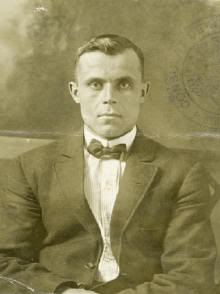Otto Abram Raisanen
| Born | 30.05.1890 |
|---|---|
| Place | Uleaborg (Oulu), Finland |
| Ethnic origin | Finnish |
| Religion | Lutheran |
| Family | Wife Ellen Jakobina Raisanen (nee Nyman, b. Finland, sister of [Julius Nyman](../NymanJI)), married 1919 in Queensland |
| Arrived at Australia |
from Finland on 12.05.1915 per Port Macquarie disembarked at Sydney |
| Residence before enlistment | Melbourne |
| Occupation | 1916 butcher, 1919 farmer, 1925 smallgoodsman |
| Naturalisation | 1920 |
| Residence after the war | 1919 Yandina, Qld; 1921 Cooroy, Qld; 1925 Yandina; 1930 Mulreany's Flats (Townsville); 1931-36 New Zealand (Auckland, Feilding, North Island, Waihi, North Island), 1936 Rockhampton; 1937 Brisbane; 1943 Glenmore, East Sydney; 1945 Yandina, Qld. |
| Died | 3.05.1962 at Nambour, Qld |
Service #1
| Service number | 367 |
|---|---|
| Enlisted | 13.05.1916 |
| Place of enlistment | Melbourne |
| Unit | 15th MG Company, 59th Battalion |
| Rank | Private |
| Place | Western Front, 1917-1919 |
| Casualties | WIA 1917 (twice), 1918 (gassed) |
| Final fate | RTA 24.07.1919 |
| Discharged | 16.11.1919 |
Materials
Digitised naturalisation (NAA)
Digitised service records (NAA)
Digitised Embarkation roll entry (AWM)
Privates Moysey Dossoeff & Otto Abram Raisanen: Russian subjects in the Army (NAA)
Blog article
From Russian Anzacs in Australian History:
An over-suspicious attitude on the part of one was often counterbalanced by commonsense from others. In August 1916 Major Hogan, from [...] machine-gun depot at Seymour, reported about Dossoeff and Raisanen, two privates in his unit who 'are supposed to be Russian subjects ... These men simultaneously asking for transfer from Machine Guns to Artillery and Light Horse struck me as being peculiar, and I thought possibly they may be Enemy Agents.' He added, probably feeling he was making too much of it, 'I forward this information for what it worth'. The Intelligence officer who had to deal with this 'information' did not seem particularly concerned about them: 'The fact that both of them applied for a move at the same time would not mean anything as they evidently talked the matter over together and both came to the same conclusion'. The irony of this situation was that any contact between them would be highly unlikely: one, the smelter-man Moysey Dossoeff, was an Ossetian from the Caucasus; the other was a Finn, Otto Abram Raisanen, a former butcher who had enlisted just three days after his arrival in the country.
[...] Details of the hardships experienced by these Russians working their land [after the war] sometimes turn up in archival documents where you least expect to find such information -- which is how we learn of Otto Raisanen's trials at his farm on Black Mountain Road, near Cooroy (Queensland). [...] Having been three times a casualty on the Western Front earned him the privilege of becoming an Australian and it is from his naturalisation application that we learn: 'I lost my dwelling [by fire] and all my property ... whilst burning off a felled area of scrub on my farm on October 14, 1920'. A sense of his isolation can be gleaned from another letter he wrote to explain why he hadn't collected his service gratuity: 'Being then in the back-blocks engaged in pioneering a farm, beset with many worries and difficulties and also not being in regular touch with the outside world at the time when Gratuity money became due, it could have escaped my knowledge'.
Gallery

Otto Raisanen
Service records B2455 (NAA)
 Russian Anzacs
Russian Anzacs